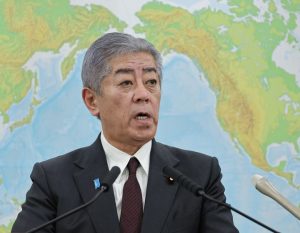Foreign Minister announces non-participation in TPNW, citing “hindrance to peace and security”
Feb. 19, 2025
by Fumiyasu Miyano and Masaharu Nakagawa, Staff Writers
Foreign Minister Takeshi Iwaya announced at a press conference on February 18 the Japanese government will not participate as an observer in the Third Meeting of States Parties to the Treaty on the Prohibition of Nuclear Weapons (TPNW), scheduled for March 3-7 at United Nations Headquarters in New York. He cited Japan’s strict security environment as one reason, stating observer participation could interfere with efforts to maintain peace and safety.
Regarding observer participation, Prime Minister Shigeru Ishiba examined cases of the past participating nations, such as Germany, which is under the U.S. nuclear umbrella like Japan. However, he decided not to participate, following the precedent set by past administrations. He had once considered dispatching a member of the Liberal Democratic Party of Japan but abandoned the idea due to opposition from key party figures, including former Prime Minister Fumio Kishida. The Ishiba administration repeatedly stated it would take into account the “historical responsibility” of an atomic-bombed nation, but its stance is sure to be tested.
Mr. Iwaya emphasized that nuclear expansion is advancing around Japan and stated, “Observer participation would send the wrong message about nuclear deterrence policy.” He also pointed out that countries such as Germany, which participated as observers, expressed a negative stance, saying the TPNW was incompatible with their security policy and that they would not be parties to the treaty.”
During the election for the Presidency of the LDP in September last year, Mr. Ishiba said observer participation was “one of the options.” In October, after being inaugurated as Prime Minister, he went further and stated he would “seriously consider” the matter. Since the end of last year, he has examined the cases of past participating nations.
To date, 73 countries and regions have ratified the TPNW. Since this year marks the 80th anniversary of the atomic bombings, the Japanese government has been urged to participate in the meeting at least as an observer, from January and onward. The call has come from the Japan Confederation of A- and H-Bomb Sufferers Organizations (Nihon Hidankyo), a Nobel Peace Prize-winning organization, as well as Hiroshima Mayor Kazumi Matsui, Komeito party leader Tetsuo Saito, and others.
In response to the government’s announcement, Mr. Saito commented, “The decision not to participate as an observer is truly regrettable. I hope the government will provide a detailed explanation of why this decision was made.”
(Originally published on February 19, 2025)
Foreign Minister Takeshi Iwaya announced at a press conference on February 18 the Japanese government will not participate as an observer in the Third Meeting of States Parties to the Treaty on the Prohibition of Nuclear Weapons (TPNW), scheduled for March 3-7 at United Nations Headquarters in New York. He cited Japan’s strict security environment as one reason, stating observer participation could interfere with efforts to maintain peace and safety.
Regarding observer participation, Prime Minister Shigeru Ishiba examined cases of the past participating nations, such as Germany, which is under the U.S. nuclear umbrella like Japan. However, he decided not to participate, following the precedent set by past administrations. He had once considered dispatching a member of the Liberal Democratic Party of Japan but abandoned the idea due to opposition from key party figures, including former Prime Minister Fumio Kishida. The Ishiba administration repeatedly stated it would take into account the “historical responsibility” of an atomic-bombed nation, but its stance is sure to be tested.
Mr. Iwaya emphasized that nuclear expansion is advancing around Japan and stated, “Observer participation would send the wrong message about nuclear deterrence policy.” He also pointed out that countries such as Germany, which participated as observers, expressed a negative stance, saying the TPNW was incompatible with their security policy and that they would not be parties to the treaty.”
During the election for the Presidency of the LDP in September last year, Mr. Ishiba said observer participation was “one of the options.” In October, after being inaugurated as Prime Minister, he went further and stated he would “seriously consider” the matter. Since the end of last year, he has examined the cases of past participating nations.
To date, 73 countries and regions have ratified the TPNW. Since this year marks the 80th anniversary of the atomic bombings, the Japanese government has been urged to participate in the meeting at least as an observer, from January and onward. The call has come from the Japan Confederation of A- and H-Bomb Sufferers Organizations (Nihon Hidankyo), a Nobel Peace Prize-winning organization, as well as Hiroshima Mayor Kazumi Matsui, Komeito party leader Tetsuo Saito, and others.
In response to the government’s announcement, Mr. Saito commented, “The decision not to participate as an observer is truly regrettable. I hope the government will provide a detailed explanation of why this decision was made.”
(Originally published on February 19, 2025)








